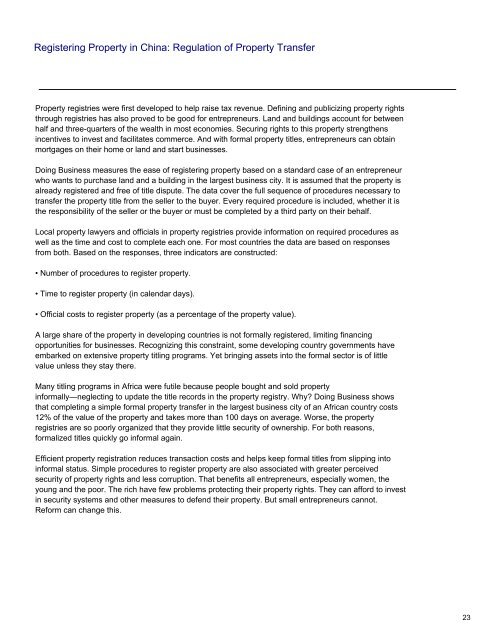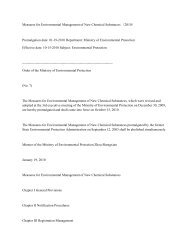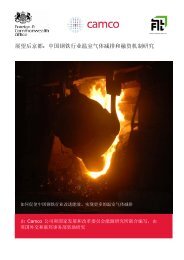View full report - NEEC
View full report - NEEC
View full report - NEEC
- No tags were found...
Create successful ePaper yourself
Turn your PDF publications into a flip-book with our unique Google optimized e-Paper software.
Registering Property in China: Regulation of Property TransferProperty registries were first developed to help raise tax revenue. Defining and publicizing property rightsthrough registries has also proved to be good for entrepreneurs. Land and buildings account for betweenhalf and three-quarters of the wealth in most economies. Securing rights to this property strengthensincentives to invest and facilitates commerce. And with formal property titles, entrepreneurs can obtainmortgages on their home or land and start businesses.Doing Business measures the ease of registering property based on a standard case of an entrepreneurwho wants to purchase land and a building in the largest business city. It is assumed that the property isalready registered and free of title dispute. The data cover the <strong>full</strong> sequence of procedures necessary totransfer the property title from the seller to the buyer. Every required procedure is included, whether it isthe responsibility of the seller or the buyer or must be completed by a third party on their behalf.Local property lawyers and officials in property registries provide information on required procedures aswell as the time and cost to complete each one. For most countries the data are based on responsesfrom both. Based on the responses, three indicators are constructed:• Number of procedures to register property.• Time to register property (in calendar days).• Official costs to register property (as a percentage of the property value).A large share of the property in developing countries is not formally registered, limiting financingopportunities for businesses. Recognizing this constraint, some developing country governments haveembarked on extensive property titling programs. Yet bringing assets into the formal sector is of littlevalue unless they stay there.Many titling programs in Africa were futile because people bought and sold propertyinformally—neglecting to update the title records in the property registry. Why? Doing Business showsthat completing a simple formal property transfer in the largest business city of an African country costs12% of the value of the property and takes more than 100 days on average. Worse, the propertyregistries are so poorly organized that they provide little security of ownership. For both reasons,formalized titles quickly go informal again.Efficient property registration reduces transaction costs and helps keep formal titles from slipping intoinformal status. Simple procedures to register property are also associated with greater perceivedsecurity of property rights and less corruption. That benefits all entrepreneurs, especially women, theyoung and the poor. The rich have few problems protecting their property rights. They can afford to investin security systems and other measures to defend their property. But small entrepreneurs cannot.Reform can change this.23











